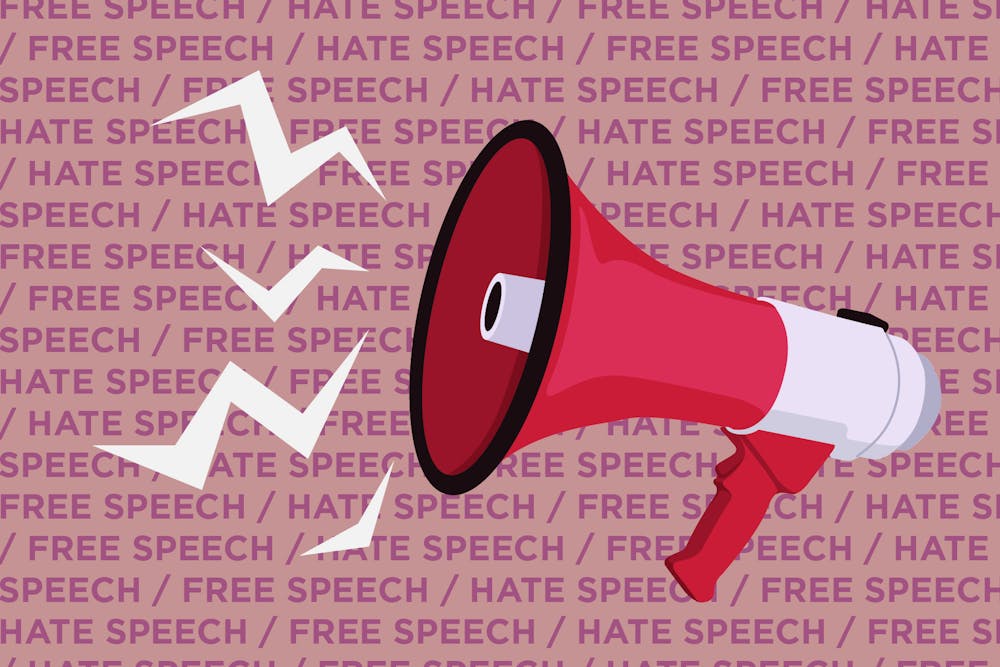If you walked past Armstrong Student Center last week, you likely noticed some unconventional and shocking goings-on. From fake moon landings to condemnations to Hell, the steps outside Armstrong have been the center of political and scientific debate.
While a white guy yelling about the moon might be hilarious to most students, some protests haven’t been as cheerful. With photos of aborted babies lining the sidewalks to posters listing characteristics of people going to Hell, these images and words are unsettling to say the least.
So, why are these unwanted and ugly protests allowed on campus?
The answer is the same reason we’re allowed to protest the overturning of Roe v. Wade or for LGBTQ+ rights: the First Amendment. That’s the beautiful thing about the United States: We can protest almost anywhere, and this right is enshrined in the Bill of Rights. But there’s one problem; the protesting we’re seeing outside Armstrong doesn’t adhere to Miami University’s values.
If I were to make a racist or homophobic comment in class, or if I were to denounce transgender rights and advocate for inequality outside Armstrong, I certainly wouldn’t be following the Code of Love and Honor. But whether Miami can do anything about it is a different question.
Miami’s Campus Free Speech Policy states that undergraduate and graduate students and faculty are protected and allowed to say anything even if considered “offensive, unwise, immoral, indecent, disagreeable, conservative, liberal, traditional, radical, or wrong-headed” by peers and other staff. Based on this policy, it looks like there’s not much Miami can do to discourage hate speech and protesting, especially as a public university.
However, other institutions have taken a step toward quashing hate speech at the source. The University of Alabama expelled a white student during the 2017-2018 school year for using the n-word on campus and on social media.
Similarly, Miami University has seen various reports of racist speech, use of the n-word and other hate speech but has done little to mitigate it, besides releasing a semi-heartfelt statement.
Why is it that the public University of Alabama can expel a student for using hate speech but Miami cannot?
Alabama’s free speech policy states that “the freedom to debate and discuss the merits of competing ideas does not […] mean that individuals may say whatever they wish, wherever they wish,” a qualifier Miami’s own policy lacks.
It is time for Miami to revise its Campus Free Speech Policy.
Regulating free speech shouldn’t be left up to the university alone, though. As students, we can take several steps toward mitigating hate speech and offensive protesting on campus.
Enjoy what you're reading?
Signup for our newsletter
Don’t engage
Students can choose whether to engage with protestors on campus. In many cases, these protestors want students to get riled up in defense of their beliefs. While defending one’s identity and beliefs is crucial to progress, sometimes silence speaks louder than words. If students refuse to engage with protestors, the protestors are less likely to come back and provoke students.
Start an anti-hate speech initiative
At the University of Wisconsin-Milwaukee, an anti-hate speech initiative has made waves among students and faculty. The Care, Respect and Expression Standing Committee at UWM educates students about what constitutes free speech, supports students affected by hate speech and guides students on how to report hate speech.
It might be time for Miami to adopt an anti-hate speech initiative, too.
Petition the university
The final step that students can take in mitigating hate speech is petitioning the university to change its Campus Free Speech Policy. If enough students desire a significant change in how Miami handles hate speech, the university is likely to respond and perhaps amend its current policy.
Even if students take these steps, hate speech won’t disappear forever. As Americans, we have to recognize the importance of free speech by upholding the principle of the First Amendment without abusing it.
When we show our appreciation of free speech by respectfully presenting different viewpoints, we can mitigate the intensity of protesting that leads to physical and verbal violence. The steps of Armstrong can be a marketplace of ideas without becoming a warzone where hate and verbal assaults are the most powerful weapons.
Eliana Riley is a sophomore majoring in integrated language arts education. She has been writing columns for The Student since her first year at Miami and self-publishes in her spare time.




